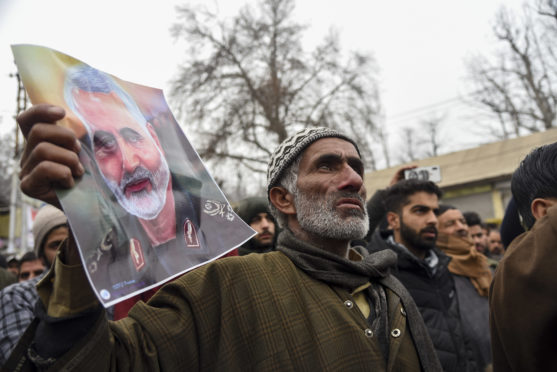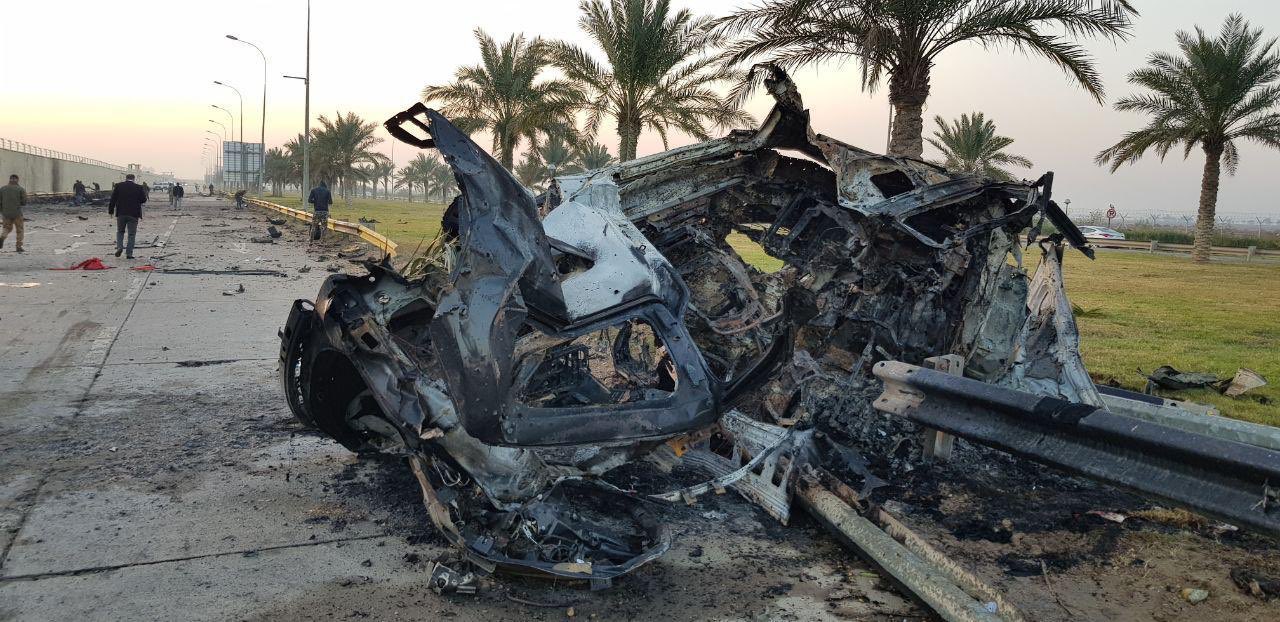
Iran yesterday warned that 35 American targets have been identified as the country’s leaders vowed vengeance for the killing of its most powerful military commander.
The threat came as three rocket attacks on American targets shook the Iraqi capital, Baghdad. The attacks targeted the highly-fortified Green Zone in the city as well as an air base housing US troops. No casualties were reported.
Earlier, a coffin carrying the body of Iranian military leader Qassim Soleimani was driven through the streets of Baghdad with thousands of mourners chanting “death to America”.
He was killed on Friday by a US air strike at Baghdad airport ordered by Donald Trump, who said the general was plotting “imminent and sinister attacks on US diplomats and military personnel”.
Gholamali Abuhamzeh, a commander in the 125,000-strong Revolutionary Guards, yesterday warned of potential attacks on US warships in the Strait of Hormuz, off Iran’s southern coast. More than 20 million barrels of oil pass through the channel each day, a quarter of global oil production.
He said: “The Strait of Hormuz is a vital point for the West and a large number of American destroyers and warships cross there. Thirty-five vital American positions in the region are within the reach of the Islamic Republic, and Tel Aviv – the US’s heart and life – is also within our reach.”
Soleimani, along with paramilitary chief Abu Mahdi al Muhandi and eight others, was killed in a drone strike on his motorcade near Baghdad’s airport. The head of Iran’s elite Quds Force was regarded as the second most powerful figure in Iran after Ayatollah Ali Khamenei.
He was the architect of Iran’s regional policy of mobilising militias across Iraq, Syria and Lebanon, including in the war against Islamic State.
Navy to protect ships through Strait of Hormuz amid tensions over US strike
Soleimani was also blamed for attacks on US troops and American allies over nearly two decades. The Pentagon said Soleimani had approved violent protests at the US embassy in Baghdad last week, which were in response to US airstrikes that had killed more than 25 fighters from an Iran-backed militia.
But Iran’s President Hassan Rouhani said the US committed a “grave mistake” in killing Iranian Soleimani.
Rouhani, a post-graduate student at Glasgow Caledonian University in the 1990s, promised retaliation as he offered his condolences to Soleimani’s family as he visited them at their home in Tehran.
Asked by a grieving relative: “Who is going to avenge my father’s blood?” Mr Rouhani replied: “We will avenge, all of us will avenge his blood. Don’t you worry.”
Thousands of mourners chanted “Death to America” as a coffin carrying the body of Soleimani was driven through the streets of Baghdad yesterday. Iran unfurled a red flag signifying revenge above the Jamkaran Mosque on the outskirts of the holy city of Qom.
More funeral services will be held for Soleimani in Iran today and tomorrow, before his body is laid to rest in his hometown of Kerman. Billboards appeared on major streets in Iran showing Soleimani and carrying the warning from Supreme Leader Ayatollah Ali Khamenei that “harsh revenge” awaits the US.
Nato has now suspended training of Iraqi security and armed forces in the region. But the US is sending nearly 3,000 extra troops in case of retaliation. The UK has 400 troops based in the region, but Trump did not tell Boris Johnson about the military action in advance.
However, according to US newspaper reports, Trump told guests at his private resort in Florida, Mar-a-Lago, there would be a “big” response to Iran that they would be hearing or reading about “very soon”.
The Stop the War Coalition yesterday held a protest outside Downing Street, warning of “the serious consequences” of the US air strike. Lindsey German, convenor of the coalition, said that “war has been on the cards for quite a long time now” due to Donald Trump “tearing up” the Iran nuclear deal and placing “draconian sanctions” on the country.
She added: “You can argue about whether this is a prelude to war, but it is an act of war. You don’t assassinate a top general without knowing there’s going to be serious consequences.”
Protestors were joined by Labour shadow chancellor John McDonnell. He said: “There’s one lesson that came from those events – it is that violence begets violence.
Jeremy Corbyn wrote to the Prime Minister, who remains on holiday in Mustique, calling for an urgent meeting of the Privy Council, the group that advises monarchs.
The outgoing Labour leader wanted to know if the “assassination” had heightened the terror risk to the UK and whether the government was given advance notice. SNP Westminster leader Ian Blackford said Donald Trump “seems to act without concern to the consequences for all”. He said: “We need to see calm heads and diplomacy to deal with a situation that has all the potential to spiral out of control.”
Former foreign secretary Jeremy Hunt said the US failure to notify the UK would be “regrettable” because allies should ensure “there are no surprises in the relationship”.
Hunt said the tensions created a “very difficult situation” for the UK as an ally of the States, adding Britain “cannot afford to be neutral”.
“But this is a very risky situation, and I think the job that we have to do as one of the US’s closest allies is to use our influence to argue for more consistent US policy,” he said.
On Friday, Trump, who is facing re-election this year and a potential impeachment trial, said he had ordered the strike as an act of deterrence rather than aggression. He said: “We took action to stop a war. We did not take action to start a war.”

Enjoy the convenience of having The Sunday Post delivered as a digital ePaper straight to your smartphone, tablet or computer.
Subscribe for only £5.49 a month and enjoy all the benefits of the printed paper as a digital replica.
Subscribe